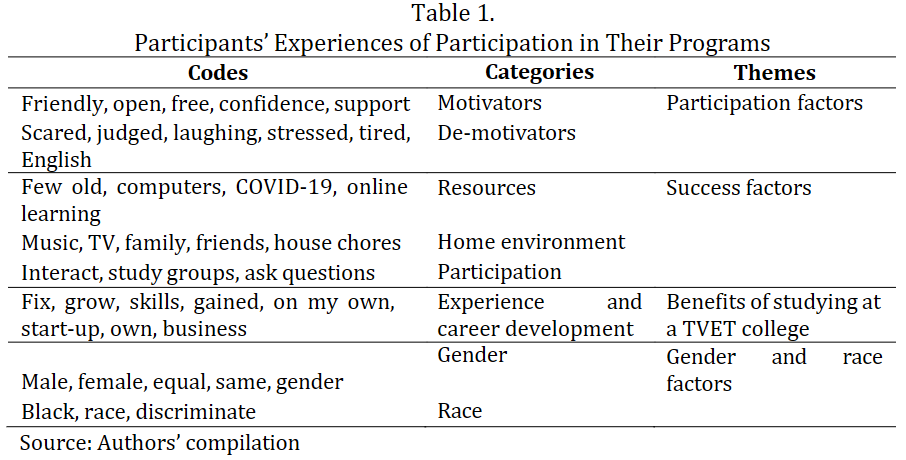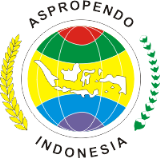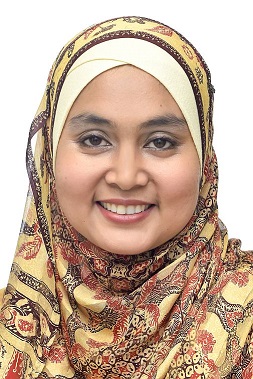AN INVESTIGATION INTO THE FACTORS INFLUENCING THE PARTICIPATION OF BLACK FEMALE TECHNICAL AND VOCATIONAL EDUCATION AND TRAINING (TVET) STUDENTS IN SOUTHERN KWAZULU-NATAL (KZN) IN SOUTH AFRICA
DOI:
https://doi.org/10.23917/jpis.v34i2.5208Keywords:
Black female TVET students, Freedoms, Gender, Participation, TVET, Success, Southern KZN, Capabilities, WomenAbstract
This study aims to identify the factors influencing the participation of black female TVET students, using a case of a TVET college in Southern KZN. It adopts a human development approach to understand the capabilities, freedoms, and functionings available to black female students at this specific TVET college. The study was prompted by high dropout rates among black female TVET students and a disproportionate gender profile in skills programs. Furthermore, it contends that empowering black female students with capabilities allows them to express what they value and have gained from TVET colleges, not only in their current lives but also in their future lives. This is crucial for addressing the prevailing gender disparities in the country. The study was conducted using a descriptive case study design, and the data was gathered through semistructured interviews with final-year black female engineering and primary agriculture students at ABC (pseudonym) TVET College. The data was analyzed thematically, with data collection concluding after reaching saturation with ten participants. Surprisingly, the findings indicate that, in this particular college, the participation of black female students is not necessarily low. Therefore, gender no longer serves as a barrier to the participation of black female TVET students in skills programs at the college. Instead, the students effectively juggle their educational responsibilities with domestic chores while exerting considerable effort to participate and excel in their studies. This showcases women's ability to exercise agency despite facing constraints in their opportunities. The study recommends addressing the persistent societal perception that domestic chores are solely the responsibility of women to enhance women’s participation in their educational pursuits.
Downloads
References
Adelakun, O. A., Oviawe, J. I., & Barfa, G. I. (2015). Strategies for Enhancing Female Participation in Technical, Vocational Education and Training. Advances in Social Science Research Journal, 2(4), 110-120. https://doi.org/10.14738/assrj.24.1041.
Adeyemi, S. L. (2004). The Characteristics of Successful Nigerian Women Entrepreneurs. Gender Discourse, 1(1), 1-12.
Azungah, T. (2018). Qualitative Research: Deductive and Inductive Approaches to Data Analysis. Qualitative Research Journal, 18(4), 383-400. https://doi.org/10.1108/QRJ-D-18-00035.
Braun, V., Clarke, V., Hayfield, N., & Terry, G. (2019). Thematic Analysis. In P. Liamputtong (Ed.), Handbook of Research Methods in Health Social Sciences (pp. 1-18). Singapore: Springer. https://doi.org/10.1007/978-981-10-2779-6_103-1.
Cech, E. (2015). Engineers and Engineeresses? Self-conceptions and The Development of Gendered Professional Identities. Sociological Perspectives, 58(1), 56-77.
Chisholm, L., Hoadley, U., Lewin, T., Moletsane, R., Haupt, I., Mawoyo, M., & Moorosi, P. (2007). Gender, Success and Institutional Culture. Pretoria: HSRC Publication.
Chopra, D., & Muller, C. (2016). Connecting Perspectives on Women’s Empowerment. IDS Bulletin, 47(1A), 1-10. https://doi.org/10.19088/1968-2016.114.
Clausen, N. (2020). An Analysis of Academic Performance of University Students in Namibia. PhD Thesis: The International University of Management Windhoek, Namibia. Accessed on: 26/05/2024, at: https://arxiv.org/pdf/2006.15179.
Cornwall, A. (2016). Women’s Empowerment: What Works? Journal of International Development, 28(3), 342-359. https://doi.org/10.1002/jid.3210.
Department of Basic Education. (2013). Report on the National Senior Certificate Examination 2013. National Diagnostics Report on Learner Performance. Pretoria: Department of Basic Education.
Department of Education. (1997). Report of the National Committee on Further Education. Pretoria: Department of Education.
Department of Women. (2015). Report on the Status of Women in the South African Economy. Pretoria: Department of Women. DHET. (2020). Annual Report. Pretoria: DHET.
DHET TVET College Website. (2021). FET Colleges – Department of Basic Education. Accessed on: 20/09/2021, at: http//www.fetcolleges.co.za.
Duflo, E. (2012). Women’s Empowerment and Economic Development. Journal of Economic Literature, 50(4), 1051-1079.
https://doi.org/10.1257/jel.50.4.1051.
Jawitz, J., Case, J., & Tshabalala, M. (2000). Why NOT Engineering? The Process of Career Choice amongst South African Female Students. International Journal of Engineering Education, 66(6), 470-475.
Jawitz, J., & Case, J. (1998). Exploring the Reasons South African Students Give for Studying Engineering. International Journal of Engineering Education, 14(4), 235-240.
Khader, S.J. (2014). Empowerment through Self-subordination? Microcredit and Women’s Agency. In D. Meyers (Ed.), Poverty, Agency, and Human Rights (pp.223-249). Oxford: Oxford University Press.
Lubben, F., Davidowitz, B., Buffler, A., Allie, S., & Scott, I. (2010). Factors Influencing Access and Students’ Persistence in An Undergraduate Science Programme: A South African Case Study. International Journal of Educational Development, 30(4), 351-358. https://doi.org/10.1016/j.ijedudev.2009.11.009.
Lwamba, E., Shisler, S., Ridlehoover, W., Kupfer, M., Tshabalala, N., Nduku, P., Langer, L., Grant, S., Sonnenfeld, A., Anda, D., Eyers, J., & Snilstveit, B. (2022). Strengthening Women's Empowerment and Gender Equality in Fragile Contexts Towards Peaceful and Inclusive Societies: A Systematic Review and Meta-Analysis. Campbell Systematic Reviews, 18(1), 1214. https://doi.org/10.1002/cl2.1214.
Lyons, E., & Coyle, A. (2016). Analysing Qualitative Data in Psychology (2nd ed.). London: SAGE.
Martineau, R. (1997). Women and Education in South Africa: Factors Influencing Women’s Educational Progress and Their Entry into Traditionally MaleDominated Fields. Journal of Negro Education, 66(4), 383-395. https://doi.org/10.2307/2668166.
Matenda, S. (2019). The Role of Technical and Vocational Education and Training in Women’s Empowerment: A Capabilities Perspective. PhD Dissertation. University of the Free State. Accessed on: 21/01/2021, at: https://scholar.ufs.ac.za/handle/11660/10058.
McGrath, S., & Powell, L. (2016). Skills for Sustainable Development: Transforming Vocational Education and Training Beyond 2015. International Journal of Educational Development, 50, 12-19. https://doi.org/10.1016/j.ijedudev.2016.05.006.
Ngugi, M., & Muthima, P. (2017). Female Participation in Technical, Vocational Education and Training Institutions (TVET) Subsector: The Kenyan Experience. Public Policy and Administration Research, 7(4), 9-23.
Nzembe, A. (2018). Access, Participation and Success: The Tri-Dimensional Conundrum of Academic Outcomes in a South African TVET college. Academic Journal of Interdisciplinary Studies, 7(2), 31-42. https://doi.org/10.2478/ajis2018-0044.
O’Brien, L., Blodorn, A., Adams, G., & Garcia, D. (2015). Ethnic Variation in GenderSTEM Stereotypes and STEM Participation: An Intersectional Approach. Cultural Diversity and Ethnic Minority Psychology, 21(2), 169-180. https://doi.org/10.1037/a0037944.
Okorafor, O.A., Okorafor, P.N., Ike, C.U., & Obi, O.C. (2014). Inspiring Women’s Participation in Technical, Vocational Education and Training for Sustainable Development in Africa. NAM Institute of the Empowerment of Women (NIEW) Journal, 6, 45-56.
Sen, A. (1999). Development as Freedom. New York: Alfred A. Knopf.
Sen, A. (2005). Human Rights and Capabilities. Journal of Human Development, 6(2), 151-166. https://doi.org/10.1080/14649880500120491.
Shackleton, L., Riordan, S., & Simonis, D. (2006). Gender and the Transformation Agenda in South African Higher Education. Women Studies International Forum, 29(6), 572-580. https://doi.org/10.1016/j.wsif.2006.10.004.
UNESCO. (2015). Education for All 2000–2015: Achievements and Challenges. Paris: UNESCO.
UNESCO. (2020). Women’s and Girls’ Access to and Participation in Science and Technology. Paris: UNESCO.
Vaismoradi, M., & Snelgrove, S. (2019). Theme in Qualitative Content Analysis and Thematic Analysis. Forum Qualitative Sozialforschung/Forum: Qualitative Social Research, 20(3), Art. 23. https://doi.org/10.17169/fqs-20.3.3376.
Wilson-Strydom, M. (2017). Widening Access with Success: Using the Capabilities Approach to Confront Injustices. In A. Mountford-Zimdars & N. Harrison (Eds.), Access to Higher Education (pp. 1-15). London: Routledge.
World Bank. (2020). Learning for All: Investing in People’s Knowledge and Skills to Promote Development: World Bank Group Education Strategy 2020. Washington DC: World Bank. Accessed on: 05/06/2021, at: https://documents.worldbank.org/en/publication/documentsreports/documentdetail/685531468337836407/learning-for-all-investingin-peoples-knowledge-and-skills-to-promote-development-world-bankgroup-education-strategy-2020-executive-summary.

Downloads
Submitted
Accepted
Published
Issue
Section
License
Copyright (c) 2024 Jurnal Pendidikan Ilmu Sosial

This work is licensed under a Creative Commons Attribution 4.0 International License.













